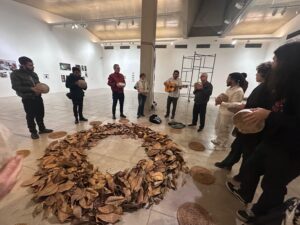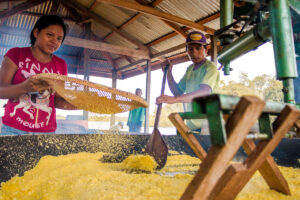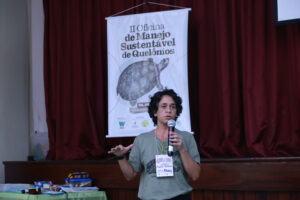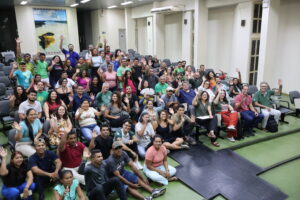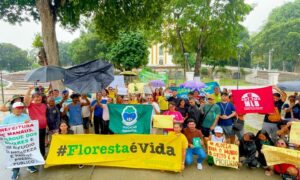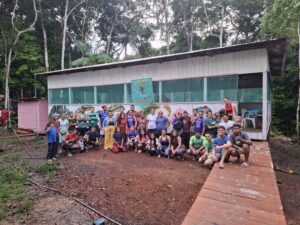The event brought together researchers, regulatory bodies and community leaders to discuss the regulation of the use of Amazonian chelonians as a means of subsistence, aiming for their balanced and sustainable use.
By Júlia Franzoi
Translated by Bruna Favaro
Between the 15th and 17th of July 2024, the Wildlife Conservation Society (WCS), in partnership with Instituto Juruá (IJ), organized a workshop at the Center for Studies of Amazonian Quelonians (CEQUA/INPA), in Manaus, to discuss the regulation of the consumption of chelonians — both eggs and adults — as a means of subsistence and the challenges for their commercial use on a community basis. The event brought together researchers, federal employees from regulatory bodies, such as ICMBio, IBAMA, SEMA, community leaders and NGOs.

The main objective of the workshop was to address the gap in the regulation of chelonian consumption by local populations. Although it is an ancient and culturally important practice for the people of the Amazon, the use of chelonians in the Amazon for food lacks clear regulation. Whilst tolerated, the practice has no official guidelines, leaving communities vulnerable to legal interpretations that often marginalize their traditions.
Chelonians of the genus Podocnemis are freshwater turtles found in the main Amazon rivers. These turtles were one of the region’s first commercial products, with their oil even being used for public lighting. This centuries-old exploitation nearly drove the species to extinction, but community management efforts, such as Programa Pé de Pincha, have helped protect their populations. In different basins of the Amazon, community beach monitors play a crucial role, protecting spawning areas and ensuring that thousands of hatchlings arrive safely at the river, contributing to the preservation of these species, which are so important for the local community ecosystem and culture.
Species such as the Amazon turtle (Podocnemis expansa) are widely valued by the riverside population. In addition to contributing to environmental balance, helping to disperse seeds and pest control, these turtles are an important source of food in areas where access to protein is limited.
Over the centuries, the populations of the Mid-Juruá and other Amazon regions have developed a deep knowledge about the sustainable management of these animals, balancing preservation with subsistence consumption. However, the lack of specific regulation has created challenges for these communities, who need to reconcile their traditional practices with contemporary legal and environmental requirements.
During the three days of discussion, crucial issues were addressed about how communities can use this natural resource in a sustainable and regulated way. “For almost 40 years, the communities living in the Juruá river basin have protected the beaches and lakes, ensuring the preservation of turtles in a decentralized way”, highlighted Eduardo Muhlen, researcher and coordinator of Territorial Governance and Sociobiodiversity at IJ. “This workshop arises as a demand from these communities, seeking regulation that respects and preserves this essential cultural practice in a region where protein sources are scarce,” says Eduardo.

In addition to promoting debate about regulations, the event was also a space to plan the next steps in protecting Amazon turtles. The proposal is that, based on the discussions, applied research will be developed in a partnership between Instituto Juruá, Projeto Pé de Pincha and WCS to better understand the situation in other basins and advance in the creation of a concrete regulatory proposal.
“The organization of communities and the Amazon conservation model, established on community-based conservation, show that this is the most appropriate time to move forward with this regulation with public bodies”, added Muhlen.
Next Steps
The workshop represented a significant step towards cultural and environmental conservation in the region, highlighting the importance of regulating ancestral practices in alignment with the preservation of natural resources and the well-being of local communities. A second round of discussions is planned, focused mainly on community and indigenous leaders. It is expected that collective actions can bring significant advances in regulating the practice and sustainable use of chelonians in the Amazon.

